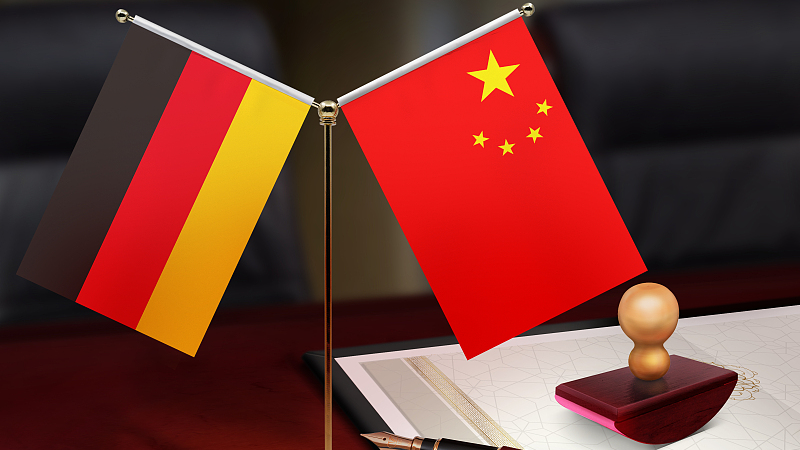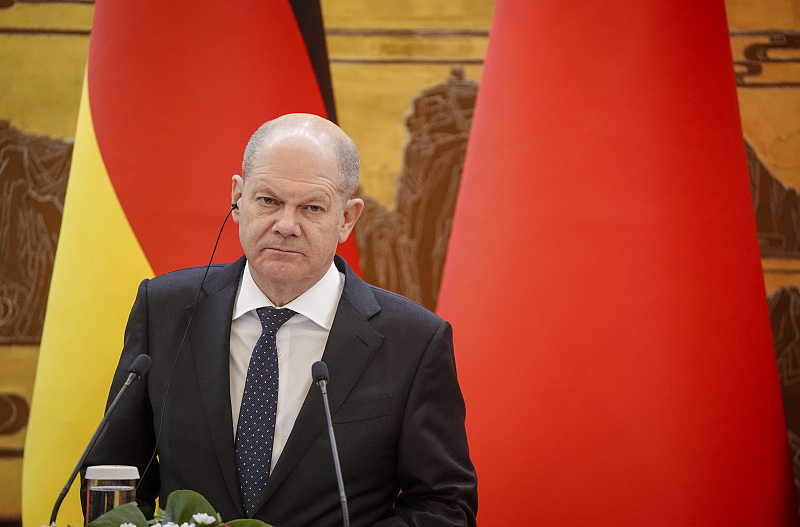
National flags of Germany and China. /CFP
National flags of Germany and China. /CFP
Editor's note: Keith Lamb is a University of Oxford graduate with a Master of Science in Contemporary Chinese Studies. His primary research interests are China's international relations and "socialism with Chinese characteristics." The article reflects the author's opinions and not necessarily the views of CGTN.
It has been a long time since the corporate media has accused China of "slavery" and "genocide." Perhaps those who make a living from contorting facts and concocting stories are working hard on the next "China horror" sequel. Considering the preposterous slander, already thrown at China, they will have to push the boundaries of imagination to make a "trilogy."
For them, the problem is their glaring lies, omissions, and exaggerations have been uncovered. Though no public statements have been made, many European politicians must be cognizant of this slander. This is evidenced by Germany and others seeking closer relationships with Beijing.
Sino-German economic relations are set to prosper in 2023. The German Chamber of Commerce polled 593 China-based German companies and half expect a rise in turnover in 2023 compared to 2022. 77 percent of surveyed German enterprises expect to expand their industries in China over the next five years.
Data from the Ministry of Commerce showed that in the first ten months of 2022 German foreign direct investment soared to 95.8 percent. German industries see China as an important market for manufacturing and consumption. BMW will build a new battery production factory in Liaoning Province and Mercedes-Benz is expanding its China operations to manufacture 60,000 trucks a year, which will be sold in the China market.
When Westerners think about genocide, it is Germany that stains their historical consciousness. For Germany, so great is this scar that when it comes to disseminating far-right propaganda, its liberal publishing laws are circumvented. Anyone who denies the Holocaust undermines the foundations of the post-1945 state and risks imprisonment.
Due to this history, Germany is particularly sensitive to genocide claims and Germans are conscious of not repeating historical mistakes. If China was committing heinous acts, German industry and politicians would not be expanding cooperation.
Some detractors will argue that this seeking of closer collaboration is merely a realist pragmatic defense of a state's self-interests along with the interests of sections of capital that profit from the China market. They will argue that increased Sino-German cooperation doesn't negate the aforementioned slander which they will defend as factual.
On one hand, a critical stance to government can be fruitful. When I studied the "slavery" and "genocide" claims, I did not take them at face value but thoroughly checked sources and funding. This proved that Washington-funded agencies, the military-industrial-complex, and to a lesser extent other Anglosphere states were funding these claims.
With this funding clear, it becomes difficult to argue that Germany is operating from a realist perspective while the U.S.' anti-China claims emanate from a moral stance. One way for China's detractors is to take an absolute realist stance, where all states do what they must and power dictates. Here, U.S. slander for the sake of state interests becomes a necessary tool.
However, taking this stance in international relations leads to the loss of all moral authority, which is an essential tool for guiding humans. If supporters of U.S. anti-China propaganda defend it on nihilist-realist grounds then they unmask U.S. hegemonism behind the mask of moral superiority and "consume" their own argument.
My suggestion is to take a factual-based argument. When fact-checking the "slavery" and "genocide" claims they collapse. "Witnesses" change their stories to increase the gore, "back to work" schemes become slavery, and contraception becomes "genocide." Sources link to each other in a circular fashion where claims to "authority," such as an organization, rather than a verifiable fact become the basis of claims.

German Chancellor Olaf Scholz gives a press conference in the Great Hall of the People, Beijing, China, November 4, 2022. /CFP
German Chancellor Olaf Scholz gives a press conference in the Great Hall of the People, Beijing, China, November 4, 2022. /CFP
With this in mind, Germany's increased cooperation with China is on a sound moral footing. German industry has set up shop in China's Xinjiang Uygur Autonomous Region, which has been the target of "slavery" and "genocide" claims. Volkswagen's investigation showed there was "no forced labor" in their factories.
Some have labeled German Chancellor Olaf Scholz's recent visit to Beijing as "a sign [that] China is simply too powerful to ignore." I say China is a country that offers great potential to all partners and seeks common ground with Germany in avoiding historical tragedies.
During World War Two, China was on the right side of history and its peaceful rise belies the China-threat propaganda. Its incredible progress, which has lifted hundreds of millions out of poverty, proves that it has done the most for improving human rights. This is simply a China that is too good to ignore.
Germany must stay on the right side of history and not fall into past mistakes. One of these mistakes would be to seek hegemony or ally with it. When it came to the illegal invasion of Iraq, which is one of the greatest human rights tragedies of this century, Germans should be proud that they stood against hegemonism. This meant speaking out against the U.S. invasion which fractured the U.S.-German relationship.
Germany knows that war will lead to the demise of all. The conflict in Ukraine risks spreading west and may deindustrialize Germany, which has become more dependent on U.S. energy. This has heightened Germany's alertness towards hegemonism.
Germany's position toward China is an attempt to thwart unipolarity and stay on the right side of history. At some point, Germany will have to speak up again and tell Europeans and the U.S. "what we already know."
(If you want to contribute and have specific expertise, please contact us at opinions@cgtn.com. Follow @thouse_opinions on Twitter to discover the latest commentaries on CGTN Opinion Section.)